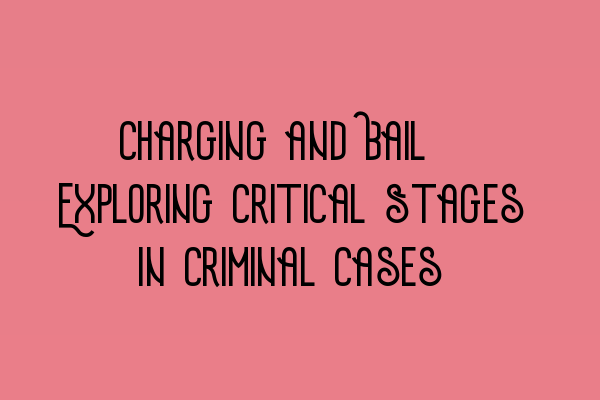Charging and Bail: Exploring Critical Stages in Criminal Cases
The Importance of Charging and Bail in Criminal Cases
In criminal cases, the stages of charging and bail play a critical role. These stages determine the course of action that will be taken against a defendant and can greatly impact the outcome of the case. Understanding the intricacies of charging and bail is essential for both defendants and legal professionals alike. In this article, we will delve into the details of charging and bail in criminal cases and explore why they are crucial to the overall legal process.
Charging: The First Step Towards Prosecution
Charging is the process through which a criminal suspect is formally accused of committing an offense. It is the first step towards prosecution and involves a legal authority, such as the police or Crown Prosecution Service (CPS), presenting evidence to support the charges. The decision to charge is based on the strength of the evidence and the likelihood of securing a conviction.
Once the charges are filed, the defendant is notified and arraigned in court. This is an important stage as it sets the tone for the entire legal proceedings. The defendant has the opportunity to enter a plea, whether it is guilty, not guilty, or no contest, which will determine the subsequent steps in the case.
Bail: Securing Temporary Release
After being charged, a defendant may be held in custody or granted bail. Bail is the temporary release of a defendant from custody, provided they comply with certain conditions, such as surrendering their passport, reporting to the police regularly, or refraining from contacting witnesses.
The decision to grant bail or hold a defendant in custody is influenced by several factors, including the seriousness of the offense, the defendant’s criminal history, and the likelihood of the defendant absconding or interfering with the case. The court aims to strike a balance between the defendant’s right to liberty and the protection of the public.
Exploring the Impact of Charging and Bail
The charging and bail stages have significant implications for all parties involved in a criminal case. For the defendant, the decision to charge can have immediate consequences, such as arrest and the initiation of legal proceedings. The right to bail can provide temporary freedom, allowing the defendant to consult with legal counsel, prepare for the case, and potentially maintain employment or family commitments.
On the other hand, the decision to deny bail can result in pretrial detention, which can have detrimental effects on the defendant’s mental and emotional well-being. It can also disrupt personal relationships and make it challenging to gather evidence and effectively defend against the charges.
For legal professionals, understanding the nuances of charging and bail is essential for providing effective representation to their clients. They must navigate the complex legal framework surrounding these stages and advocate for their clients’ rights and best interests.
Conclusion: Navigating Charging and Bail in Criminal Cases
Charging and bail are critical stages in the criminal process that can profoundly impact the outcome of a case. Proper understanding of these stages is vital for defendants and legal professionals alike. If you require legal assistance or advice regarding charging and bail in criminal cases, our team at SQE Criminal Law & Practice Law UK can provide expert guidance. Contact us today to learn more.
Related Articles:
SQE 1 Practice Exam Questions
SQE 1 Practice Mocks FLK1 FLK2
SQE 2 Preparation Courses
SQE 1 Preparation Courses
SRA SQE Exam Dates
